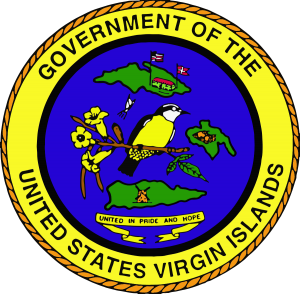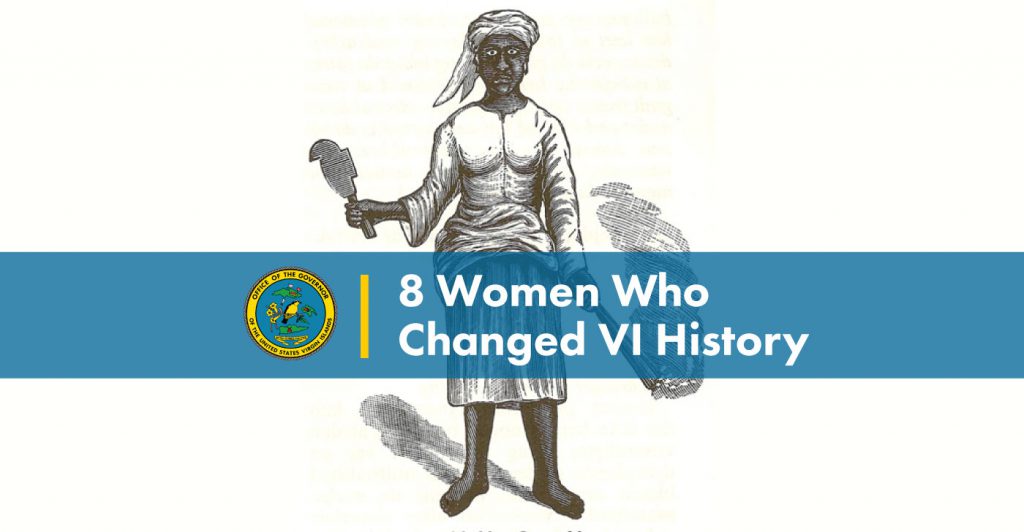In honor of International Women’s Day and VI History Month, we’re highlighting three brave women to whom the Territory owes a great debt. These women were early trailblazers on the road to a Virgin Islands where women have freedom, equality and power. There is still work to be done, which is why we look back to gain inspiration and encouragement from the Virgin Islanders who have gone before us.
Queen Mary
Mary Thomas, known as Queen Mary, (ca. 1848–1905) was one of the leaders of the 1878 “Fireburn” labor riot, or uprising, on the island of St. Croix.
Mary Thomas was from Antigua and arrived in St. Croix in the 1860s to take work on the plantations in the island. After the 1848 emancipation of enslaved Africans in the Danish West Indies, an 1849 labor law fixed salaries and labor conditions for all plantation workers and prohibited bargaining for better wages or work conditions. This made plantation work unattractive and many workers opted to leave the plantations and the islands, to seek better conditions elsewhere. The government reacted to the labor shortage by making it harder to for workers to leave the islands, demanding health certificates and charging fees for passports. When wages were to be negotiated in the fall of 1878, the workers’ demands were denied, and new harsh conditions for traveling were imposed. This sparked the so-called Fireburn riots, which have been called the largest labor riot in Danish history, and during which more than 50 plantations were burned.
Because of her role as a leader during the uprising Mary Thomas came to be known as “Queen Mary”. The workers chose her and two other women, “Queen Agnes” and “Queen Matilda”, as “queens” to perform ritual and celebratory functions during the uprising. Queen Mary was arrested and tried with other leaders of the labor uprising. At the trial of the labor leaders Thomas was sentenced to death for arson and looting but had her sentence commuted to life imprisonment, and was transferred to Copenhagen and placed at Women’s Prison, Christianshavn in 1882, but in 1887 was sent back to Christiansted, St. Croix to serve the remainder of her sentence.
Anna Heegaard
Anna Heegaard remains an intriguing figure in Virgin Islands history. She is credited with improving conditions for the enslaved African and “Free Colored” population of the Danish West Indies in the 19th century as a result of her 20 year relationship with the islands’ Governor General, Peter von Scholten.
According to the Encyclopedia of Antislavery & Abolition, “Heegard undeniably influenced the movement for legal and social equality for free black men and women in the Danish West Indies.”
Heegaard was born in St. Croix in January of 1790 to unmarried parents described as a “free mulatto woman” and a Danish Government clerk. She grew up with her mother and half siblings in Christiansted. Heegard relied on her wits and charm to form liaisons with St. Croix’s wealthiest and powerful men, eventually crossing paths with the Governor-General not long after his arrival in 1827. By that time, she had herself become a relatively prosperous woman.
Heegard and the Governor-General began meeting regularly to discuss the plight of the Free Colored population and she is believed to have helped him prepare a list of social reforms that he presented to the Danish King, who appointed a commission to study and carry out new rules for social justice for non-whites in the D.W.I. . Reforms for the “unfree” eventually included – a regulated length of work day, curtail of corporal punishment, banning of public slave auctions, a reprieve for pregnant women, establishment of schools and housing improvements.
Von Scholten also worked to lift barriers for free black and colored people – placing them in public positions and hosting racially integrated social functions, to include his own dinner parties presided over by Heegard. They lived as man and wife for most of two decades, though von Scholten had a family in Denmark, and eventually the pair settled at the Bulows Minde Estate House outside of Christiansted.
Von Scholten is credited with eventually emancipating all those enslaved in the Danish West Indies in 1848, however some historians argue that he had no alternative given the well-planned rebellion of the slaves at that time. His actions were deeply criticized by planters and others that benefited from slave labor and von Scholten returned to Denmark shortly thereafter.
Heegaard died in 1859 and was buried near present day Orange Grove.
Bertha C. Boschulte
Bertha C. Boschulte (1906 – 2004) remains one of the most valued educators in Virgin Islands history. The number of awards and honors bestowed upon her by the Legislature and professional societies amply attest to that fact, including giving her name to the middle school in the Bovoni area of St. Thomas. Less noted among her contributions to the education of Virgin Islanders, however, was her commitment to the continuing education of teachers. Ms. Boschulte founded the first St. Thomas Teachers Institute, and established the St. Thomas Evening School for those unable to participate in the daytime professional development curriculum. To this day, public school teachers in the Virgin Islands, by contract, have designated days during the school year when classes for students are cancelled and teachers are required to attend professional development seminars and workshops. Ms. Boschulte was active in many aspects of community service to include a term in the Virgin Islands Legislature beginning in 1964.
Ansetta De Chabert
It may be concluded that her father’s influence led Ansetta de Chabert to become one of the territory’s most successful entrepreneurs. When she was born in Christiansted in 1908, her father was among St. Croix’s successful merchants, operating “The Little Red Shop”. Ansetta learned to manage the family store at a young age, especially when her father went fishing.
Later, after marrying Ralph D. de Chabert, a high profile civil servant, the couple made several major land purchases, beginning with Rosegate and Olive, which became a thirty-five acre dairy farm. The de Chaberts later added Estates Jerusalem, Hope, and Blessing and expanded their dairy operations. Their contemporaries often observed how the couple complemented each other so well as they built their lives together.
It was beginning in 1955, however, following the passing of her husband, that Ansetta de Chabert proved her individual business acumen. She continued to manage and expand the family’s assets, and eventually, in 1965, struck a deal with Hess Oil to sell a large tract of land. Among the subsequent investments she made was development of the Sunny Isle Shopping Center, which remains a major feature of the St. Croix economy.
Ansetta de Chabert would eventually enter public service – serving as a member of the Virgin Islands Board of Education and becoming a member and official of the Democratic Party. Her achievements, especially in the world of business, were remarkable – particularly given that in her time women were often regarded as less capable. Ansetta de Chabert helped dispel anyone who met her of that notion.
Arona Petersen
When Arona Petersen was born in 1908, much of what was learned about how our preceding generations lived was passed along by the telling of stories. She mastered this oral tradition, and kept it alive during her lifetime as a resident of St. Thomas. There are many who for whom such stories were both education and entertainment before the dominance of cinema, radio, and television. The style of communicating, as well as what was being communicated, provides valuable insight into the traditions of a people. Mrs. Petersen’s written works, Herbs & Proverbs, Kreole Ketch N’ Keep, and Food and Folklore of the Virgin Islands make good reading not only because of their content, but also her unique style of delivery. Her weekly newspaper column further traditionalized the distinct Virgin Islands flavor of our language.
Mrs. Petersen’s knowledge of herbal remedies was widely respected, as was her expertise in the use of herbal seasonings in the kitchen. She solidified her place among legendary cooks of the region when she prepared for a television film crew Arona’s Stuffed Breast of Veal, not since duplicated, but still remembered by those who were present for the feast.
Senator Ruby Rouss
At a time when African-American GI’s were assigned to duties in support of fighting troops, there was an outstanding exception, Staff Sergeant Ruby Margaret Rouss (1921 – 1988) of St. Croix. Her assignment placed her at Supreme Headquarters Allied Powers Europe. SSGT Rouss performed secretarial duties in the office of the Supreme Allied Commander, General Dwight D. Eisenhower, who went on to become President of the United States. Ruby Rouss would enter the world of politics, also, but here in the Virgin Islands. After winning successive terms in the Virgin Islands Legislature as a St. Croix District Senator, she was chosen by her colleagues to be Senate President, marking a first among the territories and states.
While her efforts to win higher office were unsuccessful, Senator Rouss was a forceful voice in the Legislature for many years, championing many causes which she believed to be in the interests of “the little man.” Although insisting on decorum, discipline and order when she presided over legislative sessions, Ruby M. Rouss revealed a soft and compassionate side in her private life, adopting and raising five children and befriending countless other families. Even her staunchest political foes acknowledged her unmatched influence and many positive contributions in bidding a final farewell.
Edith Bornn
Attorney Edith Bornn (1922-2010) was a passionate community activist, an advocate for children and families, a committed environmentalist, a leader in local and regional politics, and an exceptional Virgin Islands matriarch of the local Bar, who blazed trails in numerous fields beginning in her earliest days.
As the first female attorney to enter into private practice locally, Mrs. Bornn opened doors for an entire generation of women in the legal field. She represented the U.S. at women’s conferences around the world and spent much of her life assisting women in having a greater voice in civic life. She was an officer and charter member of the International Federation of Women Lawyers and the World Peace Through Law Center. In her role as an attorney, she worked diligently on behalf of children and women through her efforts to create and enforce laws for their protection, becoming a national expert in the field of family law. Many of her cases established local and national precedent and continue to be cited by the courts and in law schools. Attorney Bornn was a founding member and cherished the work of the Women’s League from 1956. She remained a staunch supporter of the Family Resource Center from its inception and is considered a pioneer in the field of mediation.
Following her death in 2010, then Delegate to Congress Donna Christensen, submitted Mrs. Bornn’s many achievements into the U.S. Congressional Record.
Lorraine Berry
Lorraine Berry was a 12-term senator and 2-term Senate President of the Legislature of the Virgin Islands. During her 12 terms, Berry drafted about 400 pieces of legislation and chaired eight committees. She was one of only two women Senate Presidents and the only person to serve as Senate President twice.
Her achievements include earmarking fundings for the Charlotte Kimelman Cancer Institute and the Virgin Islands Cardiac Center and spearheading legislation to allow government employees to donate their sick leave hours to their colleagues. She is also known for starting the Symposium (formerly: the Women’s Symposium) following Hurricane Marilyn.
Berry died of colon cancer in 2010. The Lorraine L. Berry Legislative Annex was named in her honor in 2013.

